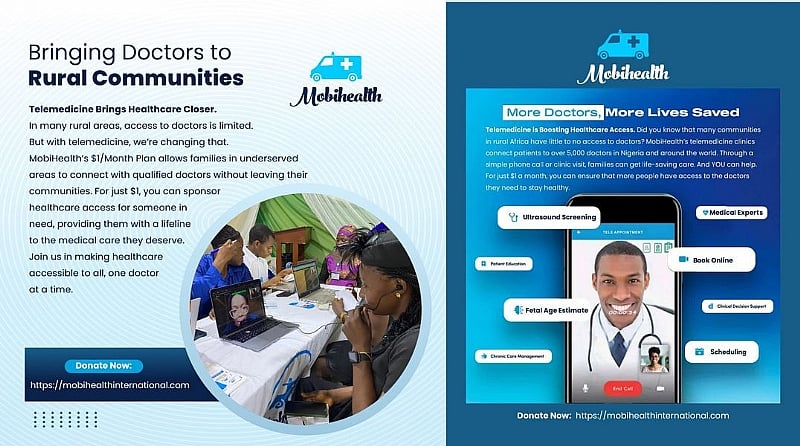In many rural areas of Africa, millions of children and expectant mothers face severe health challenges due to inadequate access to medical care. Dr. Funmi Adewara, a passionate advocate for healthcare equity, shares a personal connection to this mission. Growing up in Nigeria, she experienced the struggles associated with medical emergencies and accompanied her mother, a nurse, on hospital visits. Through these experiences, Dr. Funmi saw firsthand how long distances to healthcare facilities often escalated routine situations into life-threatening emergencies. Her mother’s tireless dedication to caring for patients inspired Dr. Funmi to commit her life to addressing the healthcare disparities faced by those in her community. This led to the establishment of MobiHealth, a telemedicine initiative designed to provide essential healthcare services to vulnerable populations in rural Africa.
MobiHealth is driven by the belief that access to healthcare should not be determined by geographical location or financial status. In many regions, pregnant mothers often lack vital prenatal care and vaccinations for their children, leading to preventable diseases and severe health complications. MobiHealth’s mission, articulated by Dr. Funmi, is a direct response to this crisis: “No one—especially pregnant mothers and children—should be denied access to healthcare because of where they live or their financial situation.” Through innovative solutions like the $1/month health plan, MobiHealth is committed to improving healthcare access and outcomes for these underserved populations, demonstrating that collective action can create significant change.
For just $1 a month, donors can make a considerable difference in the lives of children and pregnant mothers who desperately need medical attention. MobiHealth’s telemedicine platform allows families in remote areas to access necessary healthcare services without the burden of traveling long distances. Telehealth clinics are equipped with sustainable solar power and internet access, enabling healthcare professionals to provide essential services even in the most isolated locations. This model not only addresses the immediate need for medical care but also offers long-term solutions by ensuring that mothers receive prenatal care, children get vaccinations, and families have access to doctors and diagnostic services when they need them the most.
MobiHealth’s approach to healthcare delivery is highly community-focused. By setting up telehealth clinics in underserved regions, the organization ensures that even those without smartphones or computers can obtain medical care. Individuals can visit local clinics to consult with healthcare professionals via video or phone calls. This innovative model effectively breaks down barriers to healthcare access, emphasizing the importance of meeting the unique needs of each community. Dr. Adewara emphasizes that the $1/month plan enables families to receive vital healthcare services without navigating the challenges of traditional healthcare systems, ultimately contributing to better health outcomes for mothers and children.
Anyone interested in helping children and pregnant mothers in rural Africa can support MobiHealth’s mission by contributing $1 a month. Individuals can sign up on MobiHealth’s campaign page, share the message with their networks, and stay updated on the impact of their contributions. The power of collective giving has the potential to generate substantial funding to establish more telemedicine clinics across Africa, exponentially increasing the number of families who benefit from accessible healthcare services. Dr. Adewara highlights that mobilizing many people in this initiative can lead to meaningful transformation for vulnerable populations, illustrating the impact one person can have when they join a larger movement.
Ultimately, MobiHealth’s mission extends beyond temporary fixes; it aims to build a sustainable healthcare system that will benefit families for generations. The integration of telemedicine, partnerships with global organizations, and the support of individual donors creates a robust infrastructure that ensures ongoing access to care for mothers and children. By participating in the $1/month plan, supporters are not only making a financial contribution but also instilling hope within communities, inspiring healthier futures for mothers and children alike. Dr. Adewara’s vision is clear: by uniting to support healthcare accessibility, we can make a significant difference in overcoming the health challenges faced in rural Africa, one dollar at a time.


